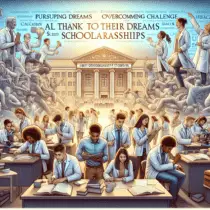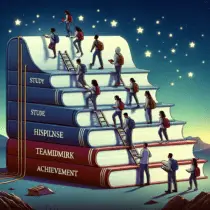Introduction
Higher education in the United States has always been a dream for many international students. The quality of education, research opportunities, and exposure to diverse cultures make it an attractive destination. However, the cost of pursuing higher education can be a significant barrier for students from overseas.
Fortunately, there are numerous scholarships available for international students that can help turn their dreams into reality. These scholarships not only provide financial assistance but also open up a world of possibilities and unleash opportunities for students seeking to pursue higher education in the USA.
Types of Scholarships
1. Merit-based Scholarships:
Merit-based scholarships are awarded to students based on their academic achievements, talents, leadership abilities, or other exceptional qualities. These scholarships are highly competitive and prestigious.
2. Need-based Scholarships:
Need-based scholarships are awarded to students who demonstrate financial need. These scholarships take into account factors such as income levels, household size, and additional expenses.
3. Program-specific Scholarships:
Program-specific scholarships are offered by universities or colleges to attract talented international students to specific programs or fields of study. These scholarships focus on academic excellence and contribute to building a diverse student body.
Popular Scholarships for International Students
1. Fulbright Foreign Student Program:
The Fulbright Foreign Student Program is one of the most prestigious scholarship programs globally. It offers grants for graduate study in various fields, including arts, sciences, humanities, and social sciences. The program covers tuition fees, health insurance, and living expenses.
2. Hubert H. Humphrey Fellowship Program:
The Humphrey Fellowship Program provides a year of professional development and non-degree academic study in the United States. It is open to experienced professionals who have a demonstrated commitment to public service in their home countries.
3. AAUW International Fellowships:
The American Association of University Women (AAUW) offers international fellowships for women pursuing full-time graduate or postgraduate studies in the United States. These fellowships support women breaking through barriers and pursuing leadership roles.
Application Process
Applying for scholarships can be an intricate process; however, with careful planning and preparation, it can be a rewarding experience. Here are some general steps to follow:
1. Research: Thoroughly research available scholarships using reliable sources such as official university websites or scholarship search platforms.
2. Check Eligibility: Review the eligibility criteria for each scholarship to ensure that you meet all the requirements before applying.
3. Prepare Documents: Gather all necessary documents such as academic transcripts, recommendation letters, essays, and financial statements well in advance.
4. Craft a Strong Application: Pay attention to the scholarship application requirements and tailor your application accordingly. Highlight your achievements, aspirations, and how the scholarship will contribute to your academic or career goals.
5. Submit Applications Early: Don’t wait until the last minute to submit your applications. Aim to submit them well before the deadline to avoid any technical issues or delays.
Frequently Asked Questions (FAQ)
Q: Can international students receive full scholarships?
A: Yes, some scholarships cover tuition fees, living expenses, and other costs associated with studying in the USA.
Q: Are there any scholarships specifically for undergraduate students?
A: Yes, there are various scholarships available for undergraduate international students based on academic performance and financial need.
Q: How can I find additional scholarships apart from the ones mentioned?
A: Apart from the popular scholarships listed, you can utilize scholarship search platforms or contact the international student office at universities for more information on available scholarships.






